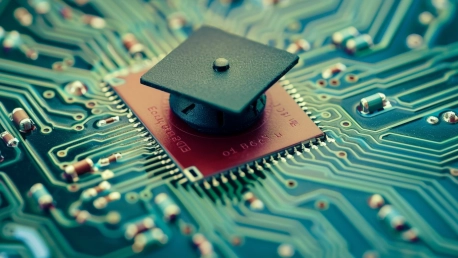The digital revolution in higher education has ushered in an era where edtech platforms are essential in disseminating knowledge. While they offer innovative avenues for learning, they also stir concerns about intellectual property (IP) rights and academic freedom. As these powerful tools reshape the academic landscape, the pressing need arises to uphold the sanctity of academic contributions against the backdrop of rapid technological change. Such safeguarding efforts require not only institutional policy reform but also collective action from the academic community to ensure that the evolution of educational technology aligns with the core tenets of academic integrity and liberty.
The Battle over Intellectual Property in Digital Education
With the proliferation of digital education, a silent tug-of-war for IP rights has emerged. As faculty members deploy edtech platforms, they often enter into agreements that can covertly erode their control over their own intellectual output. Licensing agreements that institutions sign with platform providers can be vast and intricate, with fine print granting extensive usage rights to the tech companies. The implications are profound: academics may inadvertently relinquish control, allowing their crafted course materials to be repurposed or monetized without their explicit consent. This section probes the depth of such agreements and the precarious position in which they place the original creators of educational content.
Data Privacy and Commercialization Concerns
Data reigns supreme in the digital age, and the education sector is no exception. Edtech companies harvest swathes of user data, from login patterns to intricate assessments of student engagement. This trove of information holds immense commercial value, driving platform enhancements and marketing strategies. Yet, the commodification of such data raises red flags about privacy and the potential exploitation of both educators and learners. This section dives into these concerns, examining how the dynamics of data collection and usage are not just reshaping educational technology, but also potentially distorting the essence of academic work.
AI & the Threat to Academic Autonomy
Artificial Intelligence (AI) asserts a profound influence on edtech platforms, offering promises of efficiency and advanced analytics. However, the rise of AI-infused educational tools casts a shadow on the sanctity of academic freedom. Automated content generation and assessment tools could usurp the role of educators, relegating them to bystanders in the pedagogic process. This part of the discussion centers on the tension between embracing innovation and preserving the foundational freedom that educators have traditionally enjoyed in shaping curriculum and guiding learners.
The Role of Educator Unions in the Technological Age
In this evolving digital terrain, educator unions emerge as critical defenders of IP rights and academic freedom. They are entrusted with the mandate to demand transparency and fairness in the contracts between educators, institutions, and platform providers. This section outlines the ways in which unions can play a decisive role in securing the interests of academic professionals, encouraging engagement and awareness about the nuances of IP in the age of edtech.
The Need for International Protective Measures
As digital technologies become more deeply ingrained in higher education, the need for internationally recognized protections grows more urgent. The forthcoming review of the UNESCO recommendation concerning higher-education teaching personnel presents a timely platform for advocating such global standards. This section illuminates the importance of an updated instrument that adequately addresses digital-era concerns, supporting policies that enshrine the rights and freedoms of the academic workforce against the backdrop of burgeoning educational technologies.
Teacher Unions: Campaigning for Educational Sovereignty
The digital revolution has transformed higher education, with edtech platforms becoming vital for knowledge sharing. These platforms have introduced new learning opportunities, but they also raise concerns around the rights of intellectual property and academic freedom. As these technologies alter the educational environment, there’s an urgent need to ensure academic work is protected. This calls for policy updates within institutions and collective efforts from the academic community. By taking action, we can ensure that the advances in educational technology do not compromise the principles of academic integrity and freedom. It’s critical to balance technological progress with the respect for scholarly work to preserve the integrity of higher education.









